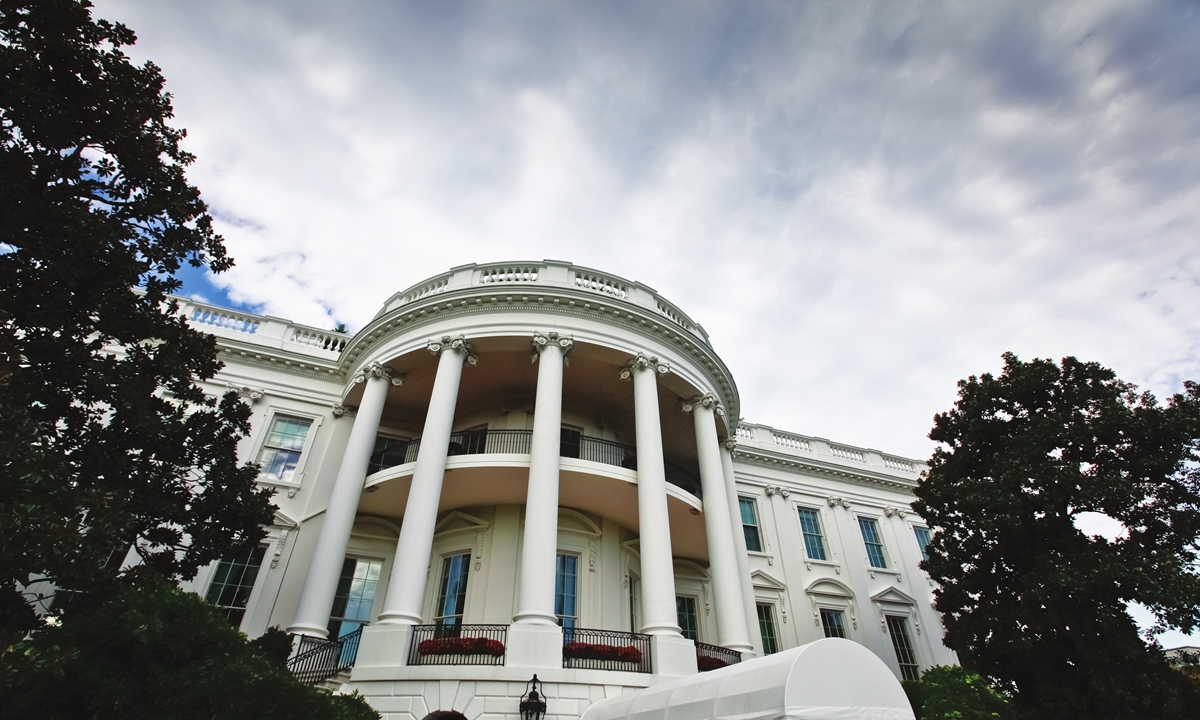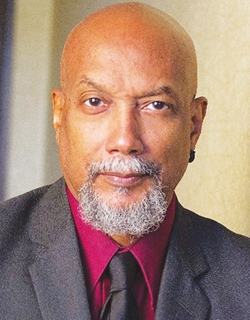US decision-makers cannot handle end of white supremacy: former vice presidential candidate

Photo: VCG
Editor's Note:
Ajamu Baraka (Baraka), the Green Party nominee for Vice President of the US in 2016, told I-Talk show why nowadays a third party can hardly affect the monopoly of the Republican Party and the Democratic Party in US politics and how partisanship will evolve. He also discussed China-US relations, stressing that white supremacy is what's driving much of US policy. "They cannot accept the fact that they are quickly facing the real prospect of the end of white supremacy. And they can't handle it."
GT: You were once the vice presidential candidate for the Green Party in 2016. What impact could a third party have on the monopoly of the Republican Party and the Democratic Party of US politics?
Baraka: What it could have is to expand the space of political discourse and provide the US population with more choice. But there are some objective and structural contradictions - the duopoly as we refer to it - the two main parties that basically control the political process that represents the class interest of the bourgeoisie in the US. They have structured the election laws in such a way where it becomes very difficult or even impossible in some cases for a so-called third party to run. We faced that back in 2016, where we were able to get on the presidential ballot in 46 states. But in 2020, the Green Party candidate was only able to get on the ballot in 30 states. And they had the right end in the other states. In fact, what happened was that the Democratic Party engaged in a process of suing various state processes, like in Wisconsin and Pennsylvania, to keep the Green Party off the ballot and they were successful.
So the monopoly is intact. It would expand a democracy if there was a real democracy in the US. But right now, democracy in the US is still aspirational.
What we find today is that we have a form of democracy. But what we have, in fact, is a dictatorship of the capitalist class. Reform seems to be almost impossible. What needs to take place is a complete restructuring of these processes. And what that suggests is a fundamental restructuring of the entire edifice of governance in the US. We need radical change in the US if we're going to be able to be at some point a democracy that corresponds to the conditions of the US.

Ajamu Baraka Photo: Courtesy of Baraka
GT: There is hardly any compromise in US partisan struggles. For instance, the topics of gun control and abortion are dividing the US in a profound way. When do you think can this issue be solved?
Baraka: We see those issues as being almost divergence from the deeper structural issues that the nation faces. Gun control, for example, is connected to the deepening social crisis in the country that is manifest not only in terms of mass shootings, but also in terms of how violence is depicted in the culture.
When you understand that this country was established as a settler colony, the instrumentality which was used to establish and expand a settler colony is occupied by an indigenous people. At the core of that process is violence. So violence has always been a fundamental part of the US experience.
It is the same thing as the issue of abortion. Basically, we see that what is really in place has to be addressed is not just access to abortion as important as that might be, but what the framework referred to as reproductive justice. So the question is, for example, what about those women who are poor? Who decide that they want to have a child? What kinds of societal support systems are in place that allow for a child to be born and to be raised in conditions of security or where their fundamental rights are protected, or where they have access to food, housing, clothes, quality education, and healthcare.
So the framework that goes beyond the limited objective of abortion rights is reproductive justice. And those issues of reproductive justice, again, go to the structural nature and the structural contradictions of society. For us, those are the issues that are more important. Then these issues that are polarizing, but they don't get us to what we need to go, which is a critical examination of the structure of the society and a commitment to transcend these structures and to build something completely new that addresses the people-center human rights of the people of this country.
GT: When you commented on the Summit for the Americas, you suggested US diplomacy is dominated by white supremacy. Do you think the US' China policy is somewhat affected by white supremacy?
Baraka: Of course. And Trump understood that it would be much easier to galvanize support for aggressive US policies toward China, than even Russia. Why? Because of the issue of racialization, the issue of white supremacy, the psychopathology of white supremacy. I find it impossible to deal with people who are infected with this disease, with dignity or in an equal way.
The anti-China potentiality is there. We saw it already in the US with some of the irrational violence directed toward people of Chinese descent who have lived in the US for a few hundred years. That was just the tip of the iceberg. White supremacy is what's driving much of US policy. There are people making critical decisions for US policies that seem to be delusional. They cannot accept the fact that they are quickly facing the real prospect of the end of white supremacy. And they can't handle it.
GT: It seems that the two main political parties in the US can only reach consensus on China-related affairs. Meanwhile, the solution to many problems in the US depends on China. How do you see such contradictions?
Baraka: It's important to know that there were real divisions within the foreign policy community vis-à-vis China. Until the Trump administration, even Trump himself was more committed to trying to galvanize a support for his focus on China. He wanted to pivot away from the conflict and the tensions with Russia, but he wasn't allowed to do that at first, but gradually, he was able to win most of the ruling elements over to his focus on China. And that's what we saw with the so-called trade wars. We saw the continuation of the so-called pivot to Asia, and of the abrogation of the intermediate nuclear forces treaty.
And the Biden administration has, in fact, continued that. They have, again, doubled down.
Unfortunately, it is probably going to continue to deteriorate, unless we're able to build a more effective anti-war, anti-imperialist movement in the US. US policymakers made it clear in their policy statements that they're still committed to the doctrine of full-spectrum dominance. They don't hide this. This is their objective and national security strategy. As long as they have that commitment, then the global environment is a dangerous, destabilizing one. And you couple that with what appears to be floundering of the part of the policy formulations by the Biden administrations and the immaturity and ineptitude of western European leaders, and the disarray we see in the UK.
GT: The FBI recently searched Trump's Mar-a-Lago estate. In one of your tweets, you said that the public sees clearly that the raid constitutes government overreach and a partisan move. What, do you think, is the purpose of FBI's moves?
Baraka: It appears to me that the strategy on the part of the democrats is twofold. One is to provide a basis to a disqualify Trump for running in 2024, but secondly, to also undermine his influence.
The problem with this though is this is a very dangerous strategy, because Trump received the second highest vote in US history, which is 74 million votes. Of course, Biden came in No.1. So the attempt to undermine the ability of Trump to run again with that kind of social base is running the risk of further destabilizing of the society politically as already in a crisis of legitimacy when it comes to all of the US institutions. It seems that the consequences of this strategy in this fragile environment can be completely unknown. It could be very violent or it could be other kinds of consequences that we can't even imagine. So it's a very dangerous strategy.
No one would be surprised if the Republicans use this as an opportunity, if they control the House of Representatives, to launch investigations in ways similar to what we see coming from the Democrats.
So the revenge is there. And they have a number of things that they want to examine. For example, the whole evolution of the so-called Russiagate. There is a lot in terms of very troubling questions around how some of the same agencies involved in the FBI conducted themselves in those months leading up to the election and afterward. They also have the issue of Hunter Biden. There's never really been clearly explored the connection of the Bidens, and Ukraine. Many people have forgotten, but for many Republicans, they are still interest in taking a look at the Clinton Foundation. There is a very attempting and tantalizing targets for the Republicans, if they in fact seize political power.
GT: Your work is to apply international human rights standards to the US. That's interesting. Could you give a detailed introduction? Does this mean that US human rights standards need international scrutiny?
Baraka: US law has to be based on human rights standards. We see as a contradiction for the US to pretend to be a leader of human rights when its law and practice is anything but practices in law that are in correspondence with human rights standards. We believe that if there's going to be legitimacy and the international human rights framework, that has to be a framework that is applied equally to all nations.
For example, when we were building the US human rights network that would apply international human rights standards to the US, looking at issues of mass incarceration that we have in the US, looking at the failure of the US state to address the basic human rights needs of the people around issues like food security, access to food, our health care, education, a clean environment, water that was safe, the jobs that will allow people to live in a decent way.
So the basic material needs of the people which are reflected in a number of the human rights instruments from a universal declaration on human rights, to do the international covenant on economic, social, and cultural rights, of the rights of child and women, and of the right to be free of racial discrimination. These are all the international framework that has to be applied also to the US.
But we say also that we go beyond the international framework as important as it is. We say that we have to have a framework even more relevant to the needs of the people, especially developing people who are still trying to free themselves from the yoke of Western colonialism.
We center our work in what we call the people-centered human rights framework. This is the human rights framework of people who don't have power, but who we say that the range of human rights are created by the people in struggle that would not and should not be constrained by the international framework.
We embrace, for example, the notion of self determination, but we also raise up the right to development, the collective rights. So we need to transcend the sort of individualistic framework of the liberal framework. That is what we see. And that's what we strive for and something very similar that what we see developing in China with a state power and the commitment to people-centered human rights.
GT: America has always been known as city upon a hill. Do you think the US still deserves this title?
Baraka: We believe that the US never deserved that title. The point in history a city upon the hill, something to be admired and copied, was that when they started their march across the US territory slaughtering the indigenous people, was that when they transported Africans from the African continent to provide labor in the US, was that it wages wars against the Mexicans and against various indigenous populations, was that when they then spilled after they marched across the territory by the late 1800s, was when they then started to move further to the west by conquering people. So when was this shiny city on the hill, I we don't see it. From our perspective, it is all a myth - the idea of the American dream where you had people who were kids and confined to child labor, where you had a working class that was super exploited.
We don't see where this is something that's viable. And we're so happy that peoples and states around the world are finally putting a stop to allowing for the US to pretend to be some kind of champions of human rights and democracy, to call them out on their own history and to demand honesty in a national discourse. So, this is a terrible myth like the American dream. And we don't give it any credibility at all.

